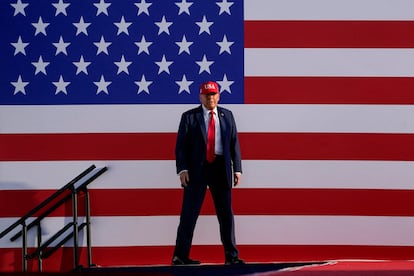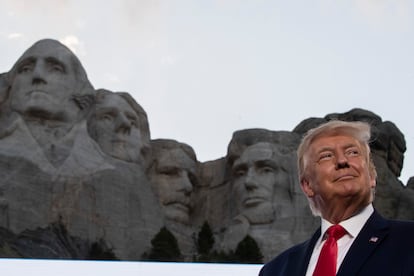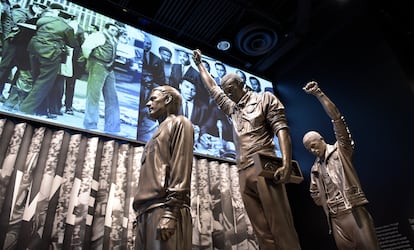This is how Trump plans to rewrite American history in time for the 250th anniversary
The president launches a nationalist and ‘patriotic’ program at a rally in Iowa, ahead of the 2026 celebrations, with an approach that worries historians


On January 18, 2021, two days before Donald Trump left the White House at the lowest point of his political career and 12 days after instigating the assault on the Capitol, the 1776 Commission published its findings. The then-president of the United States had commissioned the task force—made up of 18 conservative intellectuals, politicians, and activists, and no historians—to draft a report on how best to promote “patriotic education.” The result was intended to be a “powerful account of the effect that the principles of the Declaration of Independence have had on the history” of the United States, as well as “a powerful rebuttal” to attempts to rewrite it from the “radical left.”
That text was met with harsh criticism from experts of both political persuasions, but things didn’t go any further: after all, the United States seemed on the verge of overcoming the Trump anomaly, and everything suggested he was headed straight for the dustbin of history.
Almost four and a half years later, Trump is, against almost all odds and after an unequivocal electoral victory, back in the White House. And he is ready to decide how this country intends to remember its revolution against the British and the Declaration of Independence, which will be 250 years old on July 4, 2026.
The U.S. government’s official activities program kicked off on Thursday, the eve of the big Independence Day holiday, with a Trump rally in the capital of Iowa. The writer Bill Bryson famously quoted the city: “I come from DesMoines. Somebody had to.” It turns out it’s also one of the U.S. president’s “favorite places in the world,” or so he said this week, a week in which the Gallup pollster published a survey concluding that Americans’ patriotism (only 59% of whom say they are “very or extremely proud of being American”) has reached an all-time low.
The event in Iowa turned into one of his classic rallies, in which he combines attacks on his enemies with a pitch of his latest triumphs; in this case, the Congressional approval that same day of an ambitious spending and tax reform called the “One Big Beautiful Bill” (BBB). Trump, fresh from signing a decree to make the ticket price to national parks more expensive for foreigners, announced the most “America First” activity possible: the celebration of a Great American State Fair and a “patriotic games” competition in 2026. He also announced what at first sounded like one of his jokes, but is apparently not: a mixed martial arts combat at the White House, organized by his entrepreneur friend Dana White, for an audience of 20,000 to 25,000 people.

Since returning to power, the U.S. president has devoted considerable effort to undoing the changes in museums and school curricula triggered by the murder of George Floyd by a white police officer. Historians fear he will use the anniversary to further pursue that agenda, given his expressed desire to return racist statues toppled in 2020 to their pedestals, his zeal in renaming military bases and aircraft carriers, and his order to expunge the names of prominent abolitionists and gay rights advocates from federal websites.
In March, he signed a decree demanding the ideological cleansing of cultural institutions and calling for “restoring truth and sanity to American history.” “Rather than a return to sanity,” the Association of American Historians criticized at the time, “it is a whitewashing to destroy the truth.” As a result of Trump’s attacks on diversity policies, museums across the country dedicated to chronicling dark episodes of white supremacy have lost or are under threat of losing their federal funding.
Previously, one of Trump’s first executive actions was the creation of the Salute to America 250 task force, the texts of which bear the signature of Hillsdale College, a far-right school in Michigan. Chaired by himself and composed of members of his administration, this team will be tasked with advancing the commemoration alongside the America 250 Commission, established in 2016 by order of Congress. The latter is impartial, has about 30 members, and is chaired by Rosie Rios, who worked for Barack Obama (and so far remains in her position).

“All nationalism turns to history to impose its own version of it, creating stories that serve its political interests and often manipulating or distorting history to that end,” explains Javier Moreno Luzón, winner of Spain’s 2024 National History Prize, and author of an illuminating essay entitled Centenariomanía (Centennial Madness), about how nations celebrate their own past.
“Trump has not concealed his nationalist militancy, and judging by his plans, he will make the most of the 250th anniversary of independence to spread a certain vision of American history through all means, under the control of the White House,” he adds.
“We’ve faced enormous crises before, what Lincoln called our ‘fiery trials,’” admits the prestigious American presidential biographer John Meacham. “The difference is that now many people have chosen to follow a movement and a leader, the sitting president, who has shown himself willing to put his own interests before the principles of the Declaration of Independence and the Constitution. He hasn’t quite succeeded yet, but the fact that his attempt to seize power on January 6 [2021] didn’t work out doesn’t mean that instinct has disappeared.”

Moreno Luzón warns that “all commemorations, without exception, tell us more about the present than about the past.” And Trump seems to be aware of this, as evidenced by an obsession that dates back to the beginning of his first term, when he fantasized about observing “one of the great milestones in world history.”
The 1776 Commission was born largely as a response to the 1619 Project, a lengthy article in The New York Times Sunday magazine. It was written by journalist Nikole Hannah-Jones and proposed, among other things, turning the clock back 157 years and considering the arrival of the first slave ships on the shores of Virginia as the beginning of American history. The 1619 Project quickly became, along with critical race theory, one of the main enemies of American conservatism, along with the critical race theory that proposes confronting the country’s past as a problem of persistent systemic racism.
A garden of heroes
During those months of 2020, Trump also launched the construction of a National Garden of American Heroes, to house statues of 250 great men and women, from Abraham Lincoln to Steve Jobs and from Lauren Bacall to Harriet Tubman. In May of this year, he signed another executive order to revive the project, the location of which has yet to be determined. The idea was to have inaugurated it by July 4, 2026, but on Thursday a White House spokesperson said it would be completed at some point before the end of Trump’s term, in 2029.
Beyond its aesthetic considerations, Moreno Luzón is “struck by such an anachronistic project, typical of the statue-mania of the second half of the 19th century and the beginning of the 20th century,” and he fears that the initiative, which is getting millions of dollars in funding from the BBB, “rather than uniting, will divide citizens.”
“There is some concern among academics about the manipulation of history that the semiquincentennial may bring, which I suspect will crystallize the narrative that Trump and his people have been promoting for a decade,” warns M. J. Rymsza-Pawlowska, a historian at American University in Washington and author of a book on the “success” of the bicentennial in 1976, which included a wealth of activities underscoring Americans’ shared history.
Fifty years later, and a decade after the emergence of Trump, this idea of a shared experience cannot be taken for granted, given that memory has become another front in the so-called “culture wars.”
Next year’s celebration will feature local and state governments (especially, but not only, those in the 13 original colonies, the embryonic United States of 1776). Everyone also expects to see a strong turnout by America’s hardworking tribe of history buffs, the kind of fanatics who are commonly seen on Sundays dressed in period costume, emulating episodes from the past.
Mark Twain is credited with saying that “history doesn’t repeat itself but it often rhymes,” and with Trump in the White House, history is becoming a hot topic of political debate.
Sign up for our weekly newsletter to get more English-language news coverage from EL PAÍS USA Edition
Tu suscripción se está usando en otro dispositivo
¿Quieres añadir otro usuario a tu suscripción?
Si continúas leyendo en este dispositivo, no se podrá leer en el otro.
FlechaTu suscripción se está usando en otro dispositivo y solo puedes acceder a EL PAÍS desde un dispositivo a la vez.
Si quieres compartir tu cuenta, cambia tu suscripción a la modalidad Premium, así podrás añadir otro usuario. Cada uno accederá con su propia cuenta de email, lo que os permitirá personalizar vuestra experiencia en EL PAÍS.
¿Tienes una suscripción de empresa? Accede aquí para contratar más cuentas.
En el caso de no saber quién está usando tu cuenta, te recomendamos cambiar tu contraseña aquí.
Si decides continuar compartiendo tu cuenta, este mensaje se mostrará en tu dispositivo y en el de la otra persona que está usando tu cuenta de forma indefinida, afectando a tu experiencia de lectura. Puedes consultar aquí los términos y condiciones de la suscripción digital.








































